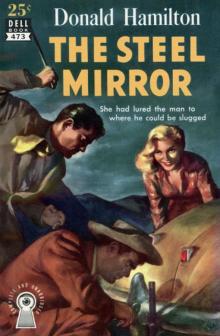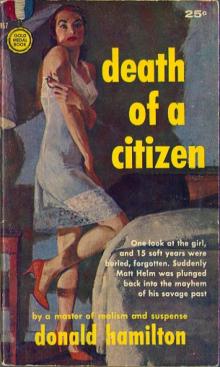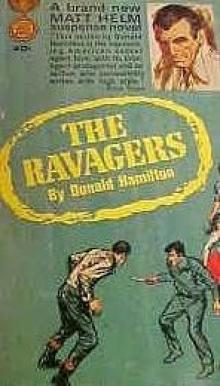- Home
- Donald Hamilton
The Vanishers
The Vanishers Read online
Contents
Cover
Also by Donald Hamilton
Title Page
Copyright
1
2
3
4
5
6
7
8
9
10
11
12
13
14
15
16
17
18
19
20
21
22
23
24
25
26
27
28
29
About the Author
Also Available from Titan Books
Also by Donald Hamilton and available from Titan Books
Death of a Citizen
The Wrecking Crew
The Removers
The Silencers
Murderers’ Row
The Ambushers
The Shadowers
The Ravagers
The Devastators
The Betrayers
The Menacers
The Interlopers
The Poisoners
The Intriguers
The Intimidators
The Terminators
The Retaliators
The Terrorizers
The Revengers
The Annihilators
The Infiltrators
The Detonators
The Demolishers (October 2016)
The Vanishers
Print edition ISBN: 9781783299911
E-book edition ISBN: 9781783299928
Published by Titan Books
A division of Titan Publishing Group Ltd
144 Southwark Street, London SE1 0UP
First edition: August 2016
1 2 3 4 5 6 7 8 9 10
This is a work of fiction. Names, characters, places, and incidents either are the product of the author’s imagination or are used fictitiously, and any resemblance to actual persons, living or dead, business establishments, events, or locales is entirely coincidental. The publisher does not have any control over and does not assume any responsibility for author or third-party websites or their content.
Copyright © 1986, 2016 by Donald Hamilton. All rights reserved.
Matt Helm® is the registered trademark of Integute AB.
No part of this publication may be reproduced, stored in a retrieval system, or transmitted, in any form or by any means without the prior written permission of the publisher, nor be otherwise circulated in any form of binding or cover other than that in which it is published and without a similar condition being imposed on the subsequent purchaser.
A CIP catalogue record for this title is available from the British Library.
Did you enjoy this book? We love to hear from our readers. Please email us at [email protected] or write to us at Reader Feedback at the above address.
To receive advance information, news, competitions, and exclusive offers online, please sign up for the Titan newsletter on our website:
www.titanbooks.com
1
I was driving from Chihuahua, Chihuahua, Mexico, to Washington, D.C., U.S.A., because, I’d been told, a car such as I’d been given to use in the Southwest was now needed in the Northeast and our current budget forced us to make the most of our limited rolling stock.
Furthermore, I’d been told, a few days of relaxed freeway driving would give me time to recuperate from the terrible strain of trying to habla español with my limited Spanish grammar and vocabulary. Never mind what the assignment down there had been. It was finished and wouldn’t worry me, or anybody else, again.
What did worry me was that I was being used as a delivery boy. Please understand, it wasn’t a question of status. I’ve been with the outfit longer than most, but if somebody needs a vehicle driven somewhere and I’m going there, hell, I enjoy driving; and I’m not too proud to play ferryman. The Matthew Helm Auto-Transport Service, at your service. However, I couldn’t help realizing that any kid with a license could have done the job. I could have flown back directly from Ciudad Chihuahua, or driven north only as far as El Paso, Texas, just over the border, turned the fancy little turbocharged Ford compact over to somebody else, and taken the plane from there. I could have been back in Washington by now, ready to do battle once more for the nation I serve and the small federal agency by which I’m employed—which I won’t name since it doesn’t exist, officially.
I didn’t buy all that nonsense about the badly needed car; we’re not so hard up we can’t pick up a baby Ford, even a loaded one, when and where we need one. It wasn’t as if the heap in question were a priceless Rolls or Mercedes, or a unique all-terrain vehicle constructed to our specifications at great expense. As for the relaxing trip, the last time Mac worried about my mental health was when an airplane crash left me with a touch of amnesia; and that was quite a while ago. I came to the conclusion that he’d ordered me to drive north and east by easy stages, instead of flying, because he simply didn’t want me in Washington, at least not yet. He wanted me out on the highway for a few days, an elusive target, reporting to a recording device at a special number to say where I was spending the night so he’d know where to make contact when he needed me.
The callback came when I was only a day away from my destination. It caught me after breakfast. I’d already thrown my bag into the car in preparation for leaving the Holiday Inn—well, one of the Holiday Inns—in Knoxville, Tennessee. If I hadn’t stepped back into the room to make sure I hadn’t left anything behind, and to kill the last couple of minutes before the specified departure time, I’d have missed it. You always wonder, in a situation like that, if you might not be better off pretending you didn’t hear anything and slipping away quietly, letting the damn thing ring; but of course you never do.
“Eric?”
“Yes, sir,” I said.
There was supposed to be some textbook ID stuff in here, in spite of the fact that he’d used my code name and that we were pretty well acquainted with each other’s voices. However, he bypassed the normal procedure, which was significant in itself.
He said, “I’m glad I caught you. We have a slight problem.”
I winced. It was a trigger phrase and I didn’t like it. I mean, if he’d mentioned a serious emergency, or even a total disaster, okay. It would have indicated merely that things were normally screwed up in Washington, no sweat; but after a previous occasion when home base had been threatened by somebody who’d considered us, rightly, as an obstacle to the attainment of certain undemocratic political ambitions, a new emergency-alert signal had been arranged between Mac and his more senior operatives, active and retired; an elite group of fairly nasty characters of which I was the ranking member. “A slight problem” meant that the ship was sinking and it was time to order the lifeboat crews to their assigned stations.
“A slight problem,” I repeated, to let him know the message had been received. “Yes, sir. How would you like me to go about solving this slight problem.”
Solving our slight problem involved for a start, I was told, carrying out the standing orders applicable to such a situation. Afterwards, as I’d been planning to do anyway, I should drive up Interstate 81 through the beautiful Shenandoah Valley between the Appalachian and Blue Ridge Mountains; but I should refrain from turning off on I-66, the main route to Washington some seventy miles to the east, as I’d intended.
Instead I should continue on to Hagerstown, Maryland, up near the Pennsylvania border. There I should stop at a certain motel—coincidentally another Holiday Inn—and check up on a certain female person in whom we were interested, who’d wound up in
the local hospital a couple of days ago for reasons that were not entirely clear. I was supposed to make them clear to myself first and then report my findings to the same contact number, the one we were using now.
Mac said, “You will, of course, keep in mind that you’ll probably be under observation from the moment you appear at the hospital and ask for the lady. You will behave in a normal manner and make your normal telephone reports to me at the office number you normally employ. We’ll both be full of concern for the patient, of course. We’ll discuss her symptoms and treatment at length. You may use the word ‘tachycardia’ to describe her condition if you wish, and any other medical jargon you happen to pick up at her bedside; but please reserve the word ‘arrhythmia,’ meaning irregularity, to indicate that you’ve actually discovered something irregular and I should check the recorder here for details. I don’t want to draw attention to this number by using it unnecessarily. Understood?”
“Arrhythmia equals irregularity, of a noncardiac and nondigestive variety. Yes, sir, I think I’ve got that.”
I hesitated. The question uppermost in my mind was why he’d saved this nursemaiding job for me. I mean, it’s only some sixty miles from Washington to Hagerstown; and he undoubtedly had agents within easy reach of his office who could have been at the Hagerstown hospital within an hour or two of the time the lady in question stumbled into the emergency room. But he’d let her wait two days on her bed of pain while I made it up from Mexico—hell, I still had five hundred miles to go. Obviously there was some reason he considered me more suitable for holding the invalid’s hand than whatever talent he had available in Washington.
I didn’t ask the question because if he’d wanted me to know what made me so special, he’d have told me. All I’d get for asking would be a slap on the wrist.
However, I was entitled to request information about the subject: “Who is this sick dame who requires a male nurse, anyway?”
“The patient’s name is Watrous, Astrid M. Watrous. Mrs. Watrous.”
I didn’t bother to try to visualize the lady. Astrid was a good Scandinavian girl-name, but it didn’t necessarily mean that the lady was a blonde and blue-eyed Norse beauty. If you’re dumb enough to bet your life, these days, on all Kathleens being Irish, or all Juanitas Spanish, or all Rachels Jewish, or all Astrids Swedish, you’re not likely to live very long.
“Never heard of her,” I said. “Under what name do I approach her?”
“Since Mrs. Watrous is using her own name, you might as well give an innocent impression, for the benefit of probable observers, by using yours. You can discard the cover we constructed for your Mexican assignment. I presume that, after returning to this country, you retrieved your own documentation in El Paso as instructed. We’ll play it in the open, at least up to a point. It’s no secret that, after the disappearance of her fairly prominent husband, Mrs. Watrous, unable to get satisfaction elsewhere, came to us for help. Under the circumstances, we’ll be expected to send somebody to the hospital to check on her condition.”
“Exactly what are the circumstances, sir?”
Mac said, “For various reasons we, like his wife, are unconvinced by the evidence indicating that Dr. Watrous vanished voluntarily.”
“I never heard of the guy,” I said. “Wait a minute. Doctor Watrous, Dr. Alan Watrous? Oceanography, or something, right? Head of a well-known scientific institute, I forget the name. Took off with a dame who wasn’t his wife—that was before I went to Mexico. And a wad of the institute’s dough. Big scandal.”
“Yes, the newspapers made quite a thing of it. But it was never proved that any money was missing; that was just a rumor.”
“But his wife’s convinced you that the newspapers, and presumably the cops, are all wet? You both think Watrous was vanished?”
“An unfortunate use of the word, Eric; but we consider it a strong possibility. And suspecting foul play in the case of the husband, we would naturally look very hard at any accident or illness affecting the wife who’s been making so much trouble about his disappearance.”
It was beginning to make a little more sense. It was a real problem, not just a question of keeping a sick woman happy. But while I’ll cheerfully admit that I’m the best little problem-solver he’s got, I still wasn’t convinced I was good enough to justify the delay involved in getting me on the job. I sensed that there was another reason why my presence was required; a reason I wasn’t being given.
“And I’m the man elected to do the hard looking?” I said. I grimaced at the phone. “Would I be looking for anything beyond the cause of her medical troubles, sir? Would I perhaps be looking for her husband, also?”
“Yes, as soon as Mrs. Watrous is released from the hospital, you will give her all the help you can in finding Dr. Watrous. And you will endeavor to keep her alive, and preferably healthy, in the process. If there should be other odd diseases going around.”
I said, “You’re obviously assuming that she’ll survive her present illness. What if she doesn’t recover from her attack of tachycardia, whatever that may be?”
“It’s very unlikely, barring complications. The condition is seldom life-threatening if treated in time; and Mrs. Watrous is making a good recovery. However, in the event that she should be lost to us for any reason, you will still make every effort to locate and liberate Dr. Alan August Watrous.”
I frowned at the inoffensive phone. There were more questions that needed answers. The one I asked was, “Can you give me a quick rundown on Mrs. Watrous’ mysterious disease?”
“The only mystery is how she managed to contract it,” Mac said. “There’s no mystery about the condition itself. You could call it the opposite of a heart attack. Instead of faltering or stopping, the heart begins to beat much too rapidly. Mrs. Watrous’ pulse was over two hundred when she reached the emergency room. The ailment is not uncommon. There are several drugs that will control it. One of them, curiously enough, is quinine, which is what she’s being given at present, quinidine to be exact. It seems to be doing the job. Her heartbeat is completely under control. There have been no more episodes; and she’s merely being retained in the hospital for observation, to make certain her condition is stable.”
I said, “As you say, sir, it’s quite a coincidence. The husband disappears. The wife acquires a sudden heart ailment which, I gather, she’s never shown any signs of previously. I presume that if she were to have another attack under conditions where help wasn’t available, she could die from it. That could be convenient for somebody. Particularly since, after this incident, it would undoubtedly go down as a natural death.”
“The thought had occurred to me, Eric.” His voice was dry; I was pointing out the obvious.
“Well, you’d better give me the priorities,” I said. “In case I have to make a choice, do I save the wife and let the husband go, or vice versa?”
Mac said calmly, “While we would, of course, prefer to have Mrs. Watrous preserved, she’s merely a means to an end.”
“I see,” I said. “And Dr. Watrous is the end?”
“No,” he said. “I am.”
I sat there for a moment listening to the traffic on the nearby freeway. “You’d better spell it out for me, sir,” I said carefully at last.
Mac said, “It’s quite simple. Dr. Watrous is not the only prominent citizen to vanish in the past year. Other important people—businessmen and politicians as well as scientists—have also disappeared, always with plausible reasons. To take just one example, a certain highly placed lady in the computer industry named Janet Beilstein, is supposed to have run off with a handsome young man and company funds, although the embezzlement angle seems to have been merely a vicious rumor. That’s pretty much the same story, you’ll note, that was circulated about Dr. Watrous. It’s been used, with variations, in other instances as well; but there have also been supposed nervous breakdowns and other explanations. I can’t give you the total number of cases, but it’s impressive, even if allowance is made fo
r the fact that, in spite of the bureaucratic paperwork that rules our lives, surprisingly many people do manage to pull down the curtain each year and are never heard from again.” He hesitated, and went on: “In the time we’ve been on the case, we’ve come up with only two promising leads. Mrs. Watrous is one. I am the other.”
I frowned at the phone in my hand. “It’s one of my dull days. I’m still not following you.”
He spoke carefully: “Let us say, hypothetically, that there is an organization devoted to abducting selected citizens for purposes still unknown, always with a suitable cover story to minimize the resulting publicity.”
“Kidnapping doesn’t seem to be exactly what’s planned for Mrs. Watrous, if we’re right about her having been drugged with the idea of eventually making it permanent.”
“But Mrs. Watrous is not a principal in this affair, Eric. To these people, whoever they are, she is merely a peripheral nuisance. Unlike her husband, she’s not well known, and she carries in her brain no valuable scientific information. She is merely a threat, not a possible asset.”
“Then where do you come in, sir? I’d think you’d fall right into the same menace classification as Astrid Watrous.”
I heard him sigh sadly at the other end of the line. “A bitter thing it is to be unappreciated by one’s own associates! I’ve served as head of this agency for a good many years. I hope I have some value to my government; and I know I have accumulated knowledge that could be useful to somebody. To be sure, I was probably not considered a primary target; but when Mrs. Watrous involved me in the case, I came under observation. It was realized that, taking the lady seriously, I had to be eliminated before I learned enough to be a real threat. However, it would be wasteful to have me killed. Because of my position I could be quite valuable.”
“You seem to have a real pipeline into this abduction outfit, sir. An informant?”
“No, just a commonsense interpretation of certain things that have been happening around me.” Mac laughed shortly. “If you were going to cause me to vanish, what explanation would you leave behind to make it seem as if I’d disappeared voluntarily? At my age I’m not, I hope, a plausible candidate for amorous entanglements. Our operational funds are, unfortunately, quite limited, so I don’t have access to large sums of money. My doctor informs me that for a man in my position, I show few signs of stress; a sudden breakdown would hardly be convincing. So why would I choose to go missing?”

 The Two-Shoot Gun
The Two-Shoot Gun Mad River
Mad River Texas Fever
Texas Fever Ambush at Blanco Canyon
Ambush at Blanco Canyon The Big Country
The Big Country The Wrecking Crew
The Wrecking Crew The Devastators mh-9
The Devastators mh-9 The Wrecking Crew mh-2
The Wrecking Crew mh-2 The Shadowers mh-7
The Shadowers mh-7 The Ambushers mh-6
The Ambushers mh-6 The Betrayers
The Betrayers The Terrorizers
The Terrorizers The Poisoners
The Poisoners The Devastators
The Devastators The Silencers mh-5
The Silencers mh-5 The Interlopers mh-12
The Interlopers mh-12 The Shadowers
The Shadowers The Annihilators
The Annihilators The Vanishers
The Vanishers Night Walker
Night Walker The Revengers
The Revengers The Frighteners
The Frighteners The Infiltrators
The Infiltrators The Intriguers mh-14
The Intriguers mh-14 The Steel Mirror
The Steel Mirror The Menacers
The Menacers Assassins Have Starry Eyes
Assassins Have Starry Eyes Death of a Citizen
Death of a Citizen Matt Helm--The Interlopers
Matt Helm--The Interlopers The Removers mh-3
The Removers mh-3 The Demolishers
The Demolishers Murder Twice Told
Murder Twice Told The Poisoners mh-13
The Poisoners mh-13 The Ambushers
The Ambushers Death of a Citizen mh-1
Death of a Citizen mh-1 The Silencers
The Silencers The Removers
The Removers The Intimidators
The Intimidators The Damagers
The Damagers The Menacers mh-11
The Menacers mh-11 The Retaliators
The Retaliators Murderers' Row
Murderers' Row The Ravagers
The Ravagers The Ravagers mh-8
The Ravagers mh-8 The Threateners
The Threateners The Betrayers mh-10
The Betrayers mh-10